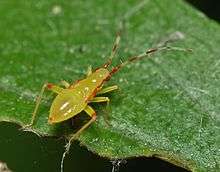Campyloneura virgula
Campyloneura virgula is a species of bugs in Miridae family. It is the only species in the genus Campyloneura Fieber, 1861.[1]
| Campyloneura virgula | |
|---|---|
| Female of Campyloneura virgula | |
 | |
| Nymph of Campyloneura virgula | |
| Scientific classification | |
| Kingdom: | |
| Phylum: | |
| Class: | |
| Order: | |
| Suborder: | |
| Family: | |
| Genus: | |
| Species: | C. virgula |
| Binomial name | |
| Campyloneura virgula (Herrich-Schaeffer, 1835) | |
| Synonyms | |
| |
Description
Campyloneura virgula can reach a length of 4–5 millimetres (0.16–0.20 in).[2] Adults have pale translucent hemelytra,[3] a red stripe on the edge of a pale green pronotum, a yellow scutellum. a black head, long red-banded antennae and bright yellow cuneus that are tipped with dark red.[2] Legs are pale yellow.[3] Nymphs are yellow, with a red stripe on the edge of the pronotum.[4]
Biology and ecology
This common predatory bug hunts for small insects, as aphids and red mites.[5] Adults flight time is from July to October during which they could be found on numerous deciduous trees, on hazel, hawthorn and oak.[2] The adults overwinter [2] and nymphs appear in May.[3]
The peculiarity of this bug is that in almost all of its range males are extremely rare, as C. virgula reproduces without mating (parthenogenesis). This characteristic has an exception in Sicily and in North Africa, where the males are commonly present and the species has a normal sexual reproduction.[6]
Distribution
This species is widespread in the Nearctic ecozone, in Europe and in the Mediterranean area up to Turkestan.[7] It has been introduced in the United States of America.[2][3]
References
- Biolib
- British Bugs
- Plant bugs on fruit crops in Canada
- Nature Spot
- Garden Safari
- Carayon J., 1989: Constant parthenogenesis proved in two heteroptera the mirid campyloneura virgula and the anthocorid calliodis maculipennis - Annales De La Societe Entomologique De France. 25(4): 387-392
- Fauna Europaea
- Henry, Thomas J., and Richard C. Froeschner, eds. (1988), Catalog of the Heteroptera, or True Bugs, of Canada and the Continental United States